17 start with O start with O
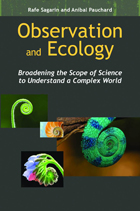
The need to understand and address large-scale environmental problems that are difficult to study in controlled environments—issues ranging from climate change to overfishing to invasive species—is driving the field of ecology in new and important directions. Observation and Ecology documents that transformation, exploring how scientists and researchers are expanding their methodological toolbox to incorporate an array of new and reexamined observational approaches—from traditional ecological knowledge to animal-borne sensors to genomic and remote-sensing technologies—to track, study, and understand current environmental problems and their implications.
The authors paint a clear picture of what observational approaches to ecology are and where they fit in the context of ecological science. They consider the full range of observational abilities we have available to us and explore the challenges and practical difficulties of using a primarily observational approach to achieve scientific understanding. They also show how observations can be a bridge from ecological science to education, environmental policy, and resource management.
Observations in ecology can play a key role in understanding our changing planet and the consequences of human activities on ecological processes. This book will serve as an important resource for future scientists and conservation leaders who are seeking a more holistic and applicable approach to ecological science.

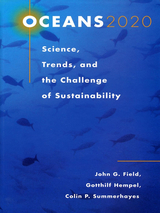
Oceans 2020 presents a comprehensive assessment of the most important science and societal issues that are likely to arise in marine science and ocean management in the next twenty years. Sponsored by the Intergovernmental Oceanographic Commission (IOC), the Scientific Committee on Oceanic Research (SCOR), and the Scientific Committee on Problems of the Environment (SCOPE), the book brings together the world's leading ocean scientists and researchers to analyze the state of marine science and technology, identify key scientific issues for sustainable development, and evaluate the capability of scientists, governments, and private-sector stakeholders to respond to those issues. Topics include:
- basic ocean sciences
- pressures on the coastal zone
- climate change and the ocean
- fisheries and fishery science in their search for sustainability
- offshore industries including oil drilling, carbon sequestration, and manganese nodule mining
- marine information for shipping and defense
Oceans 2020 suggests what can be done about major marine environmental issues through the better development and application of marine science and technology, focusing on the issues that are most closely related to human and sustainable development. It will help guide countries in developing their marine science and technology strategies and priorities and is an essential source of information for policymakers, government officials, resource managers, scientists, the media, and all those concerned with the current and future health of the oceans.
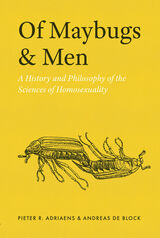
Questions about the naturalness or unnaturalness of homosexuality are as old as the hills, and the answers have often been used to condemn homosexuals, their behaviors, and their relationships. In the past two centuries, a number of sciences have involved themselves in this debate, introducing new vocabularies, theories, arguments, and data, many of which have gradually helped tip the balance toward tolerance and even acceptance. In this book, philosophers Pieter R. Adriaens and Andreas De Block explore the history and philosophy of the gay sciences, revealing how individual and societal values have colored how we think about homosexuality.
The authors unpack the entanglement of facts and values in studies of male homosexuality across the natural and human sciences and consider the extent to which science has mitigated or reinforced homonegative mores. The focus of the book is on homosexuality’s assumed naturalness. Geneticists rephrased naturalness as innateness, claiming that homosexuality is innate—colloquially, that homosexuals are born gay. Zoologists thought it a natural affair, documenting its existence in myriad animal species, from maybugs to men. Evolutionists presented homosexuality as the product of natural selection and speculated about its adaptive value. Finally, psychiatrists, who initially pathologized homosexuality, eventually appealed to its naturalness or innateness to normalize it.
Discussing findings from an array of sciences—comparative zoology, psychiatry, anthropology, evolutionary biology, social psychology, developmental biology, and machine learning—this book is essential reading for anyone interested in what science has to say about homosexuality.
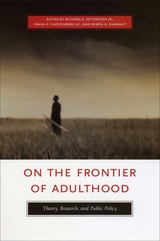
This volume considers the nature and consequences of changes in early adulthood by drawing upon a wide variety of historical and contemporary data from the United States, Canada, and Western Europe. Especially dramatic shifts have occurred in the conventional markers of adulthood—leaving home, finishing school, getting a job, getting married, and having children—and in how these experiences are configured as a set. These accounts reveal how the process of becoming an adult has changed over the past century, the challenges faced by young people today, and what societies can do to smooth the transition to adulthood.
"This book is the most thorough, wide-reaching, and insightful analysis of the new life stage of early adulthood."—Andrew Cherlin, Johns Hopkins University
"From West to East, young people today enter adulthood in widely diverse ways that affect their life chances. This book provides a rich portrait of this journey-an essential font of knowledge for all who care about the younger generation."—Glen H. Elder Jr., University of North Carolina at Chapel Hill
"On the Frontier of Adulthood adds considerably to our knowledge about the transition from adolescence to adulthood. . . . It will indeed be the definitive resource for researchers for years to come. Anyone working in the area—whether in demography, sociology, economics, or developmental psychology—will wish to make use of what is gathered here."—John Modell, Brown University
"This is a must-read for scholars and policymakers who are concerned with the future of today's youth and will become a touchpoint for an emerging field of inquiry focused on adult transitions."—Jeanne Brooks-Gunn, Columbia University
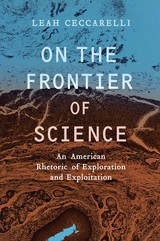

When done well, one-shot library instruction allows you to build solid relationships with faculty while also making positive first impressions with students. Good pedagogy, collaboration with faculty, assessment, and reflection are all imminently possible in the one-shot. So is incorporating the big ideas of the ACRL Framework. This new edition of a trusted resource will guide you in active, student-centered one-shots that connect to courses’ learning outcomes. Demonstrated using vignettes that share teaching experiences drawn from librarians and instructors in the field, you’ll get succinct, hands-on advice on such topics as
- why threshold concepts are well suited to one-shot instruction;
- online instruction-specific engagement strategies and talking points;
- a one-shot version of curriculum mapping to help you prioritize;
- quick and easy activities to work into sessions;
- how to mix and match the three types of instruction best suited to one-shots;
- losing the list, ditching the script, and other strategies for student-centered teaching;
- common classroom management mishaps and what to do about them;
- talking points for the instruction interview;
- how and when to say no; and
- 5 ways to use assessment to improve your instructional style.

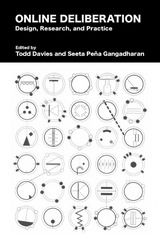
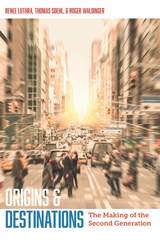
Using surveys of second generation immigrant adults in New York and Los Angeles, Origins and Destinations explains why second generation experiences differ across national origin groups and why immigrant offspring with the same national background often follow different trajectories. Inter-group disparities stem from contexts of both emigration and immigration. Origin countries differ in value orientations: immigrant parents transmit lessons learned in varying contexts of emigration to children raised in the U.S. A system of migration control sifts immigrants by legal status, generating a context of immigration that favors some groups over others. Both contexts matter: schooling is higher among immigrant children from more secular societies (South Korea) than among those from more religious countries (the Philippines). When immigrant groups enter the U.S. migration system through a welcoming door, as opposed to one that makes authorized status difficult to achieve, education propels immigrant children to better jobs.
Diversity is also evident among immigrant offspring whose parents stem from the same place. Immigrant children grow up with homeland connections, which can both hurt and harm: immigrant offspring get less schooling when a parent lives abroad, but more schooling if parents in the U.S. send money to relatives living abroad. Though all immigrants enter the U.S. as non-citizens, some instantly enjoy legal status, while others spend years in the shadows. Children born abroad, but raised in the U.S. are all everyday Americans, but only some have become de jure Americans, a difference yielding across-the-board positive effects, even among those who started out in the same country.
Disentangling the sources of diversity among today’s population of immigrant offspring, Origins and Destinations provides a compelling new framework for understanding the second generation that is transforming America.
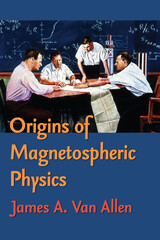

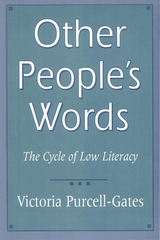
If asked to identify which children rank lowest in relation to national educational norms, have higher school dropout and absence rates, and more commonly experience learning problems, few of us would know the answer: white, urban Appalachian children. These are the children and grandchildren of Appalachian families who migrated to northern cities in the 1950s to look for work. They make up this largely “invisible” urban group, a minority that represents a significant portion of the urban poor. Literacy researchers have rarely studied urban Appalachians, yet, as Victoria Purcell-Gates demonstrates in Other People’s Words, their often severe literacy problems provide a unique perspective on literacy and the relationship between print and culture.
A compelling case study details the author’s work with one such family. The parents, who attended school off and on through the seventh grade, are unable to use public transportation, shop easily, or understand the homework their elementary-school-age son brings home because neither of them can read. But the family is not so much illiterate as low literate—the world they inhabit is an oral one, their heritage one where print had no inherent use and no inherent meaning. They have as much to learn about the culture of literacy as about written language itself.
Purcell-Gates shows how access to literacy has been blocked by a confluence of factors: negative cultural stereotypes, cultural and linguistic elitism, and pedagogical obtuseness. She calls for the recruitment and training of “proactive” teachers who can assess and encourage children’s progress and outlines specific intervention strategies.

"The most wonderfully eye-opening, or imagination-opening book, as amusing as it is instructive."—Mary Warnock, London Observer
"[A] fascinating and often humorous study of a reproductive theory that flourished from the mid-17th century to the mid-18th century."—Nina C. Ayoub, Chronicle of Higher Education
"More than just a good story, The Ovary of Eve is an object lesson about the history of science: Don't trust it. . . . Pinto-Correia says she wants to tell the story of history's losers. In doing so, she makes defeat sound more appealing than victory."—Emily Eakin, Nation.
"A sparkling history of preformation as it once affected every facet of European culture."—Robert Taylor, Boston Globe
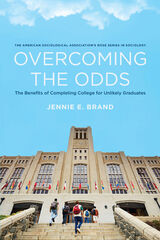
Drawing on two cohorts of nationally representative data from the Bureau of Labor Statistics National Longitudinal Surveys program, Brand uses matching and machine learning methods to estimate the effects of college completion across students with varying likelihoods of completing four-year degrees. To illustrate her findings, Brand describes outcomes using matched vignettes of college and non-college graduates. Brand shows that four-year college completion enables graduates to increase wages and household income, while also circumventing unemployment, low-wage work, job instability, poverty, and social assistance. Completing college also increases civic engagement. Most of these benefits are larger for disadvantaged than for more advantaged students, rendering arguments that college has limited benefits for unlikely graduates as flawed. Brand concludes that greater long-term earnings, and less job instability and unemployment, and thus more tax revenue, less reliance on public assistance, and high levels of volunteering indicate that public investment in higher education for students from disadvantaged backgrounds yields far-reaching collective benefits. She asserts that it is better for our society when more people complete college.
Overcoming the Odds is an innovative and enlightening exploration of how college can transform lives.
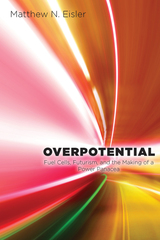
It sounds so simple. Just combine oxygen and hydrogen in an electrochemical reaction that produces water and electricity, and you’ll have a clean, efficient power source. But scientists have spent decades—and billions of dollars in government and industry funding—developing the fuel cell. There have been successes and serendipitous discoveries along the way, but engineering a fuel cell that is both durable and affordable has proved extraordinarily difficult.
Overpotential charts the twists and turns in the ongoing quest to create the perfect fuel cell. By exploring the gap between the theory and practice of fuel cell power, Matthew N. Eisler opens a window into broader issues in the history of science, technology, and society after the Second World War, including the sociology of laboratory life, the relationship between academe, industry, and government in developing advanced technologies, the role of technology in environmental and pollution politics, and the rise of utopian discourse in science and engineering.

READERS
Browse our collection.
PUBLISHERS
See BiblioVault's publisher services.
STUDENT SERVICES
Files for college accessibility offices.
UChicago Accessibility Resources
home | accessibility | search | about | contact us
BiblioVault ® 2001 - 2024
The University of Chicago Press









